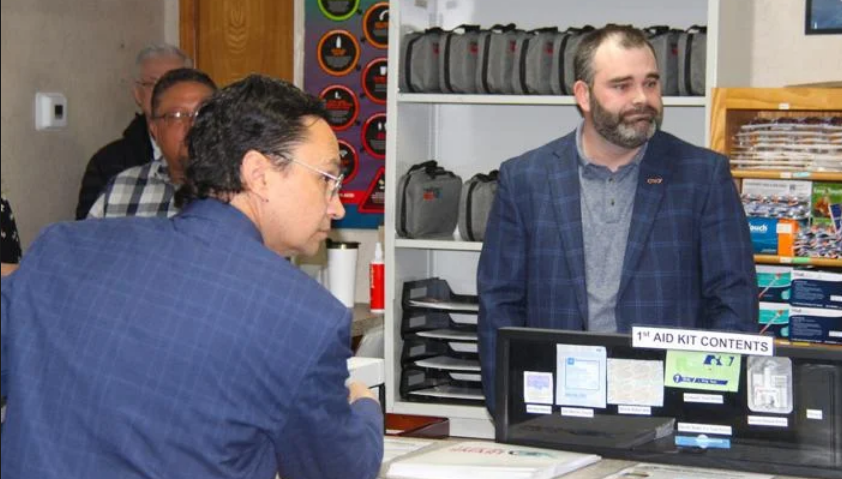
- Details
- By Chuck Hoskin Jr
Guest Opinion. Opioid addiction has taken a terrible toll on the Cherokee Nation. Once again, Native Americans have been especially targeted by people and companies making profits from addictive substances without fully revealing the dangers.
The result has been lost lives and broken families. But as a tribal nation, we are fighting back. We won a court settlement to hold the opioid industry accountable, and we are using those funds to look out for their victims. With a strategic approach to reduce the harm of opioids and other stimulants, and give people an easier path to recovery, we are entering a new era of hope and healing.
Cherokee Nation opened our first permanent harm reduction program in Tahlequah early this year. The facility provides sterile syringes, wound care supplies, Naloxone, recovery support and other life-saving resources to provide immediate help to those most in need. It is accessible to both tribal and non-tribal citizens, ages 18 and over, and it has already successfully served almost 500 people. Now, our latest effort is a Harm Reduction Mobile Van, which will extend a helping hand across our 7,000-square-mile reservation.
The mission remains urgent. We see this in the alarming rates of Hepatitis C and opioid overdoses in northeast Oklahoma. Over 30 years of research shows that harm reduction programs do not encourage illegal drug use or increase crime; instead, they significantly reduce overdose deaths and prevent the spread of viral hepatitis and HIV.
These efforts are already making a difference, and they are just the beginning. Through the Public Health and Wellness Act, Cherokee Nation is making a $100 million investment in battling addiction.
With this funding from our opioid industry settlement, we are bolstering our behavioral health programs and constructing treatment facilities across the reservation, including a world-class facility in our capital city. We are also investing in the health care workforce with a $5 million permanent endowment. This fall the first students receiving full ride scholarships to become behavioral professional will start classes and, after graduating, they will come work in our behavioral health programs.
Cherokee Nation’s programs are both innovative and compassionate. Along with Deputy Chief Bryan Warner and the Council of the Cherokee Nation, I am determined to provide the quality care that our communities deserve. We will protect the most vulnerable and lift them up through holistic recovery.

The Public Health and Wellness Act, along with the new Harm Reduction Mobile Van, are examples of our tribe's resolve to uplift wellness for all of our people. We have a real opportunity to help people regain control of their lives and shape a fresh reality. As we embrace a new century of Cherokee goodness, we are shaping a healthier, more resilient Cherokee Nation. These transformative changes will ripple through our communities and Cherokee families for years to come.
Chuck Hoskin, Jr. is the principal chief of the Cherokee Nation.
More Stories Like This
Building a World-Class Health System Through Data-Driven StrategyDenying a Seat, Silencing a Voice: Why Adelita Grijalva Must Be Sworn In Now
Law of Samhain and Pigs The sacrificial animal of Halloween
Building the Foundation Our Children Deserve
We're Still Here: Why It's Still a Good Day to Be Indigenous
Help us tell the stories that could save Native languages and food traditions
At a critical moment for Indian Country, Native News Online is embarking on our most ambitious reporting project yet: "Cultivating Culture," a three-year investigation into two forces shaping Native community survival—food sovereignty and language revitalization.
The devastating impact of COVID-19 accelerated the loss of Native elders and with them, irreplaceable cultural knowledge. Yet across tribal communities, innovative leaders are fighting back, reclaiming traditional food systems and breathing new life into Native languages. These aren't just cultural preservation efforts—they're powerful pathways to community health, healing, and resilience.
Our dedicated reporting team will spend three years documenting these stories through on-the-ground reporting in 18 tribal communities, producing over 200 in-depth stories, 18 podcast episodes, and multimedia content that amplifies Indigenous voices. We'll show policymakers, funders, and allies how cultural restoration directly impacts physical and mental wellness while celebrating successful models of sovereignty and self-determination.
This isn't corporate media parachuting into Indian Country for a quick story. This is sustained, relationship-based journalism by Native reporters who understand these communities. It's "Warrior Journalism"—fearless reporting that serves the 5.5 million readers who depend on us for news that mainstream media often ignores.
We need your help right now. While we've secured partial funding, we're still $450,000 short of our three-year budget. Our immediate goal is $25,000 this month to keep this critical work moving forward—funding reporter salaries, travel to remote communities, photography, and the deep reporting these stories deserve.
Every dollar directly supports Indigenous journalists telling Indigenous stories. Whether it's $5 or $50, your contribution ensures these vital narratives of resilience, innovation, and hope don't disappear into silence.
 The stakes couldn't be higher. Native languages are being lost at an alarming rate. Food insecurity plagues many tribal communities. But solutions are emerging, and these stories need to be told.
The stakes couldn't be higher. Native languages are being lost at an alarming rate. Food insecurity plagues many tribal communities. But solutions are emerging, and these stories need to be told.
Support independent Native journalism. Fund the stories that matter.
Levi Rickert (Potawatomi), Editor & Publisher
